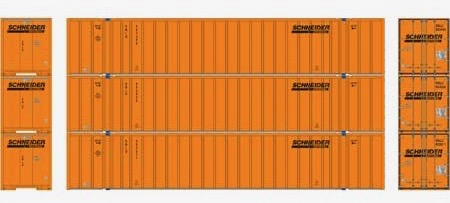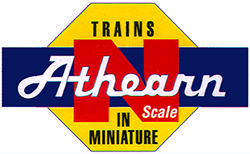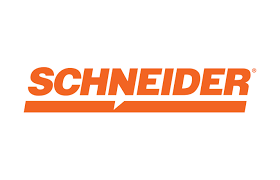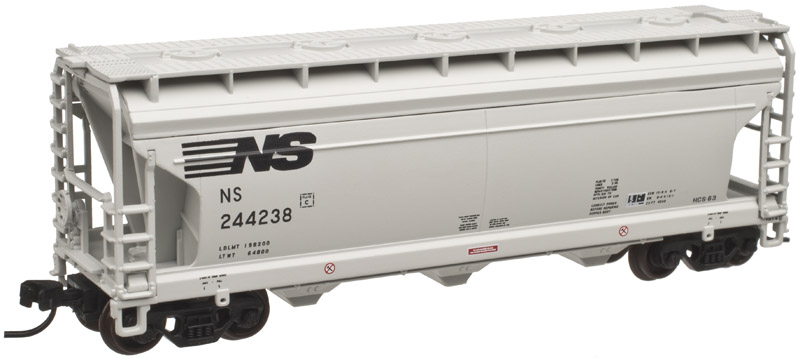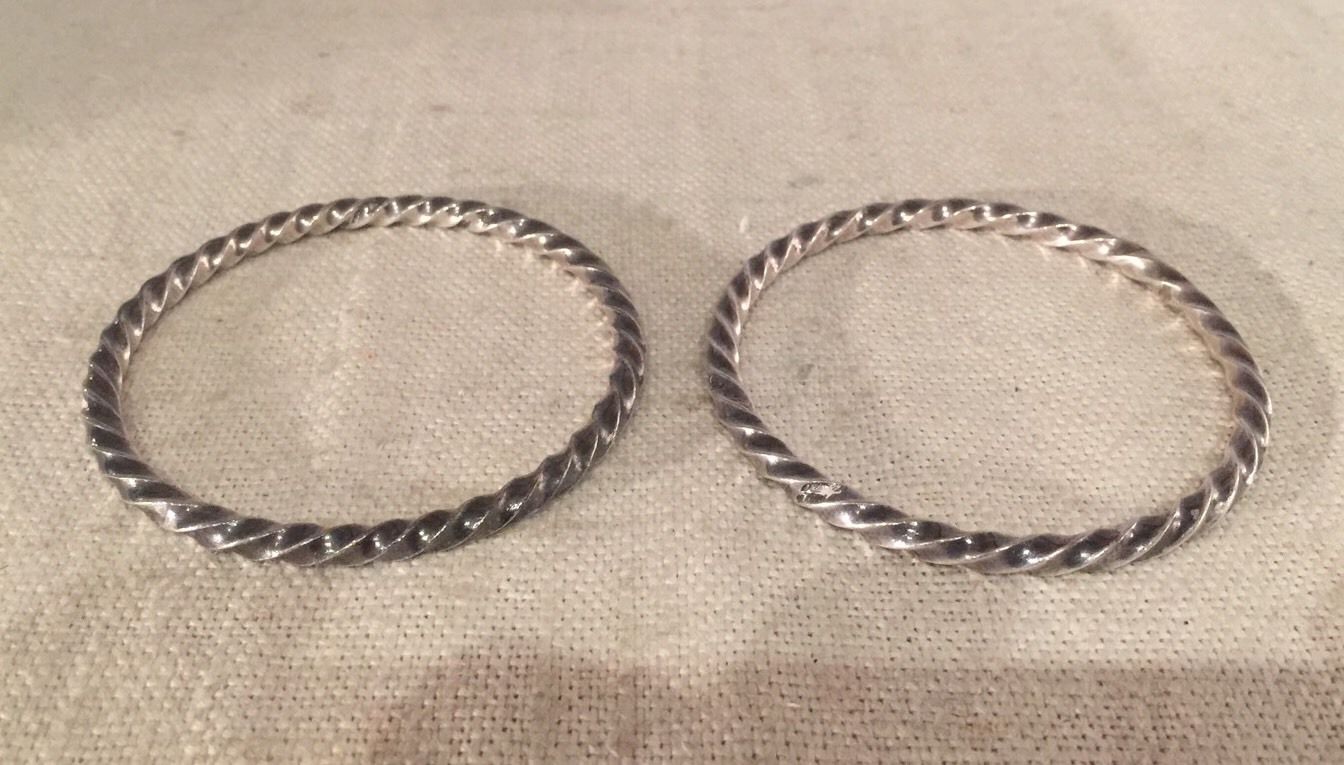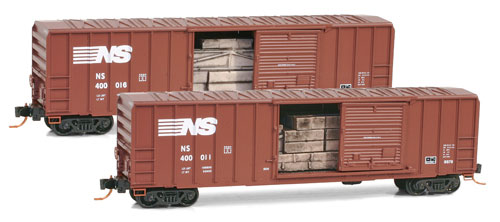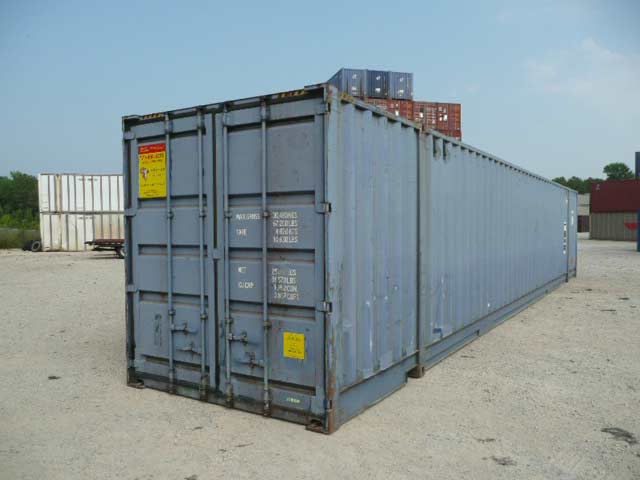Model Information: An intermodal container (also known as a container, freight container, ISO container, shipping container, hi-cube container, box, sea container, container van) is a standardized reusable steel box. Intermodal containers are used to store and move materials and products efficiently and securely in the global containerized intermodal freight transport system. "Intermodal" indicates that the container can be used across various modes of transport, (from ship to rail to truck) without unloading and reloading its contents. Lengths of containers, which each have a unique ISO 6346 reporting mark, vary from 8 to 56 feet (2.438 to 17.069 m) and heights from 8 feet (2.438 m) to 9 feet 6 inches (2.896 m). There are about 17 million intermodal containers in the world of varying types to suit different cargoes.
Prototype History: An intermodal container is a large standardized shipping container, designed and built for intermodal freight transport, meaning these containers can be used across different modes of transport – from ship to rail to truck – without unloading and reloading their cargo. Intermodal containers are primarily used to store and transport materials and products efficiently and securely in the global containerized intermodal freight transport system, but smaller numbers are in regional use as well. These containers are known under a number of names, such as simply container, cargo or freight container, ISO container, shipping, sea or ocean container, container van or (Conex) box, sea or c can.
Unlike 20ft and 40ft shipping containers | storage containers, 53ft shipping containers | storage containers are not utilized for international shipping. They are used primarily for domestic over the road and rail service. High Cube shipping containers are 9ft 6in tall on the exterior. They are 1ft taller than standard height containers. They are also 8ft 6in wide, making them 6in wider than standard containers as well. They are commonly made from 14-gauge corrugated steel. They typically have lockable double doors on one end. They are commonly equipped with 1-1/8” thick marine plywood flooring on the interior.
53ft high cube shipping containers | storage containers are perfect for commercial, industrial and rural storage applications.
Some of this text is from Wikipedia
Unlike 20ft and 40ft shipping containers | storage containers, 53ft shipping containers | storage containers are not utilized for international shipping. They are used primarily for domestic over the road and rail service. High Cube shipping containers are 9ft 6in tall on the exterior. They are 1ft taller than standard height containers. They are also 8ft 6in wide, making them 6in wider than standard containers as well. They are commonly made from 14-gauge corrugated steel. They typically have lockable double doors on one end. They are commonly equipped with 1-1/8” thick marine plywood flooring on the interior.
53ft high cube shipping containers | storage containers are perfect for commercial, industrial and rural storage applications.
Some of this text is from Wikipedia
Brand/Importer Information: Athearn's history began in 1938, when its founder-to-be, Irvin Athearn, started an elaborate O scale layout in his mother's house. After placing an ad selling the layout, and receiving much response to it, Irv decided that selling model railroads would be a good living. He sold train products out of his mother's house through most of the 1940s. After becoming a full-time retailer in 1946, Irv opened a separate facility in Hawthorne, California in 1948, and that same year he branched into HO scale models for the first time.
Athearn acquired the Globe Models product line and improved upon it, introducing a comprehensive array of locomotive, passenger and freight car models. Improvements included all-wheel drive and electrical contact. One innovation was the "Hi-Fi" drive mechanism, employing small rubber bands to transfer motion from the motor spindle to the axles. Another was the double-ended ring magnet motor, which permitted easy connection to all-wheel-drive assemblies. Athearn was also able to incorporate flywheels into double-ended drives.
The company produced a model of the Boston & Maine P4 class Pacific steam locomotive which incorporated a cast zinc alloy base and thermoplastic resin superstructure. It had a worm drive and all power pickup was through the bipolar trucks that carried the tender. This item was discontinued after the Wilson motor was no longer available, and was not redesigned for a more technologically advanced motor.
Athearn's car fleet included shorter-than-scale interpretations of passenger cars of Southern Pacific and Atchison, Topeka & Santa Fe Railroad prototypes. The company also offered a variety of scale-length freight cars with sprung and equalized trucks. The cars could be obtained in simple kit form, or ready-to-run in windowed display boxes. The comprehensive scope of the product line contributed to the popularity of HO as a model railroad scale, due to the ready availability of items and their low cost.
Irv Athearn died in 1991. New owners took control in 1994, but continued to follow Athearn's commitment to high-quality products at reasonable prices. Athearn was bought in 2004 by Horizon Hobby. Athearn was then moved from its facility in Compton to a new facility in Carson, California. In mid-2009, all remaining US production was moved to China and warehousing moved to parent Horizon Hobby. Sales and product development was relocated to a smaller facility in Long Beach, California.
Read more on Wikipedia and Athearn website.
Athearn acquired the Globe Models product line and improved upon it, introducing a comprehensive array of locomotive, passenger and freight car models. Improvements included all-wheel drive and electrical contact. One innovation was the "Hi-Fi" drive mechanism, employing small rubber bands to transfer motion from the motor spindle to the axles. Another was the double-ended ring magnet motor, which permitted easy connection to all-wheel-drive assemblies. Athearn was also able to incorporate flywheels into double-ended drives.
The company produced a model of the Boston & Maine P4 class Pacific steam locomotive which incorporated a cast zinc alloy base and thermoplastic resin superstructure. It had a worm drive and all power pickup was through the bipolar trucks that carried the tender. This item was discontinued after the Wilson motor was no longer available, and was not redesigned for a more technologically advanced motor.
Athearn's car fleet included shorter-than-scale interpretations of passenger cars of Southern Pacific and Atchison, Topeka & Santa Fe Railroad prototypes. The company also offered a variety of scale-length freight cars with sprung and equalized trucks. The cars could be obtained in simple kit form, or ready-to-run in windowed display boxes. The comprehensive scope of the product line contributed to the popularity of HO as a model railroad scale, due to the ready availability of items and their low cost.
Irv Athearn died in 1991. New owners took control in 1994, but continued to follow Athearn's commitment to high-quality products at reasonable prices. Athearn was bought in 2004 by Horizon Hobby. Athearn was then moved from its facility in Compton to a new facility in Carson, California. In mid-2009, all remaining US production was moved to China and warehousing moved to parent Horizon Hobby. Sales and product development was relocated to a smaller facility in Long Beach, California.
Read more on Wikipedia and Athearn website.
Item created by: CNW400 on 2020-10-07 15:00:13. Last edited by CNW400 on 2020-10-07 15:00:14
If you see errors or missing data in this entry, please feel free to log in and edit it. Anyone with a Gmail account can log in instantly.
If you see errors or missing data in this entry, please feel free to log in and edit it. Anyone with a Gmail account can log in instantly.


